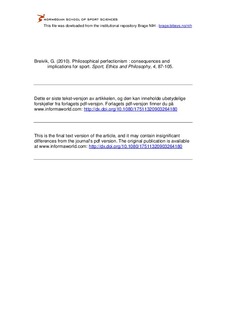| dc.contributor.author | Breivik, Gunnar | |
| dc.date.accessioned | 2011-03-08T09:19:13Z | |
| dc.date.available | 2011-03-08T09:19:13Z | |
| dc.date.issued | 2010-03-11 | |
| dc.identifier | Seksjon for kultur og samfunn / Department of Cultural and Social Studies | |
| dc.identifier.citation | Sport, Ethics and Philosophy. 2010, 4(1), 87-105 | en_US |
| dc.identifier.issn | 1751-1321 | |
| dc.identifier.uri | http://hdl.handle.net/11250/170585 | |
| dc.description | I Brage finner du siste tekst-versjon av artikkelen, og den kan inneholde ubetydelige forskjeller fra forlagets pdf-versjon. Forlagets pdf-versjon finner du på www.informaworld.com: http://dx.doi.org/10.1080/17511320903264180 / This is an electronic version of an article published in Sport, Ethics and Philosophy. In Brage you'll find the final text version of the article, and it may contain insignificant differences from the journal's pdf version. The original publication is available at www.informaworld.com: http://dx.doi.org/10.1080/17511320903264180 | en_US |
| dc.description.abstract | Ethical theories in sport philosophy tend to focus on interpersonal relations. Little has been said about sport as part of the good life and as experienced from within. This article tries to remedy this by discussing a theory that is fitting for sport, especially elite sport. The idea of perfection has a long tradition in Western philosophy. Aristotle maintains that the good life consists in developing specific human faculties to their fullest. The article discusses Hurka's recent version of Aristotelian perfectionism and relates it to various aspects of, and the good life in, sport. How much time should be spent on sport in relation to other activities, how much should one concentrate on one sport to reach one's best and how should one's efforts be spent over a season? Well-roundedness and concentration are central alternatives for theories of perfection. Similarly some activities are simple whereas other are complex and thIs poses problems for persons that want to maximise their achievements. Whereas Hurka thinks one has obligations to perfect oneself, the author of this article thinks perfection is an attractive choice but no obligation. | en_US |
| dc.language.iso | eng | en_US |
| dc.publisher | Routledge | en_US |
| dc.subject | perfectionism | en_US |
| dc.subject | sports | en_US |
| dc.subject | philosophy | en_US |
| dc.title | Philosophical perfectionism: consequences and implications for sport | en_US |
| dc.type | Journal article | en_US |
| dc.type | Peer reviewed | en_US |
| dc.subject.nsi | VDP::Humanities: 000::Philosophical disciplines: 160 | en_US |
| dc.subject.nsi | VDP::Social science: 200::Social science in sports: 330 | en_US |
| dc.source.pagenumber | 87-105 | en_US |
